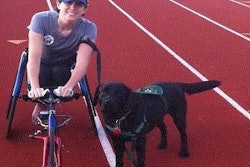Researchers from the University of Illinois at Urbana-Champaign are looking for volunteers to participate in the American Gut Project. All Americans over the age of 3 months and their pets may submit a sample to the American Gut Project, which is a study of the microbiomes in the gut.
“Previous projects, including the five-year, US$173-million NIH-funded Human Microbiome Project, focused on highly selected groups of people, and there has been no way for the general public to participate, much less their children or pets,” said Kelly Swanson, an associate professor of Animal Sciences at the University of Illinois at Urbana-Champaign, who studies the effects of diet on the gastrointestinal microbiome of humans, dogs and cats. “The American Gut Project, led by the Human Food Project, will take the microbiome field a critical step forward, moving the research from a well-controlled lab environment to the real world and gets everyone involved.”
A small home kit will be sent to those who register on the website along with a confidential questionnaire about diet and general lifestyle. After sequencing the genetic material in the gut material, participants will be provided with a print out of the bacteria and their abundance so they can compare their own gut bugs to other populations around the world.
According to Swanson: “The research is led by world leaders in the microbiome field and targets free-living populations with more application to the average American. Moreover, the project will include all members of the family, including our furry companions. The majority of data we currently have on the dog and cat microbiomes has come from a handful of small studies in research labs or clinically ill animals. This project will apply the technology to free-living pets, where diet, genetics and living environment are quite different from household to household. This research may identify important trends not possible with lab-based studies and help guide us on how to feed our pets in the future.”
















